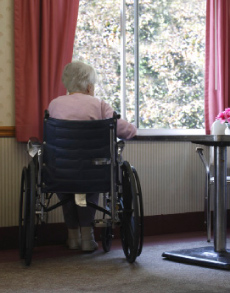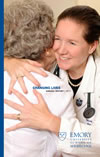In the community: Serving Others
See captions below.
Since its founding in 1854, Emory's medical school has reached out to help the most needy, serving indigent patients in hospitals and clinics, both locally and globally, and teaching medical students to carry on this work.
|
In this section Getting young people interested in research Taking transplant care to middle Georgia Slideshow key 1. Charles Moore helped create a free clinic for indigent patients at the City of Refuge in Atlanta, a nonprofit operated by the Mission Church with support from the Atlanta Housing Authority. Faculty and staff from Emory's schools of medicine, nursing, and public health volunteer in the free clinic and provide health counseling. 2. Gynecologist Lisa Flowers recently launched "HPV Uncensored" at two local high schools. The course drives home the point that human papilloma virus can cause cervical cancer and that sexually transmitted disease is preventable. 3. Last year, Mina Tran, class of 2013, helped organize "Transform Vietnam" in which she and five classmates spent three weeks shadowing doctors at a large pediatric hospital in Saigon, where the "waiting room" (outside in the heat) is routinely packed with several hundred children. 4. Leon Haley is chief of emergency medicine at the publicly owned Grady Hospital, Atlanta's safety net hospital for indigent patients. The hospital is staffed by close to 700 Emory faculty (full-time equivalent of 270) in addition to more than 360 Emory residents and fellows. Over the past two years, Haley has helped cut approximately five hours off of the length of stay for emergency department patients, while continually increasing the quality of care provided. 5. Medical student Shruthi Rereddy is one of many students who volunteer at the Harriet Tubman Free Women's Clinic at the Open Door Community on Ponce de Leon Avenue. The students get lots of help from faculty members who oversee their work. Together, they provide basic services, including Pap smears, family planning, and diagnosis of sexually transmitted disease, and refer patients elsewhere for services they can't provide. Students also help women sign up for Medicaid and other resources. The women's clinic was created by students Bridget Spelke and Joelle Rosser, who received a start-up grant from the Reproductive Health Access Project and hope to see the clinic continue to grow, involving succeeding generations of students. |
Serving at Grady
Emory medical faculty have provided the majority of physician care (currently 85%) at the publicly funded Grady Memorial Hospital for decades. Emory has helped Grady survive tough times (forgiving millions of dollars in debt), enabled it to provide vast amounts of care as Atlanta's safety net hospital for indigent patients (more than $22 million in uncompensated care by Emory faculty last year alone), and helped bring the hospital national renown in areas ranging from sickle cell and diabetes to trauma care and stroke.
Recently, the school expanded its stroke care team at Grady's Marcus Stroke and Neuroscience Center, a state-of-the-art neuro ICU led by Emory neurology professor Michael Frankel. Under his longtime leadership in stroke care at Grady, the hospital has hosted major clinical trials in stroke therapies and became the first hospital in the Southeast to offer a round-the-clock stroke team. Frankel currently is leading an NIH-funded study of biomarkers in the blood of stroke patients to determine who is at highest risk for recurrence.
Caring for the homeless
Earlier this year, third-year medical students Bridget Spelke and Joelle Rosser opened a twice-monthly women¿s health clinic at the Open Door Community on Ponce de Leon Avenue. The center already had a clinic for homeless men, often staffed by volunteer Emory medical faculty, but nothing comparable for homeless women. Spelke and Rosser get lots of help from their fellow students and from gyn-ob faculty members like Mary Dolan who oversee the students' work. They provide basic services, including Pap smears, family planning, and diagnosis of sexually transmitted disease, and refer patients elsewhere for services they can¿t provide. Students also help the women sign up for Medicaid and other resources. Spelke and Rosser won a start-up grant from the Reproductive Health Access Project and hope to see the clinic continue to grow, involving succeeding generations of medical students.
Going beyond the borders
This past year, 10 Georgia physicians—Tbilisi, Georgia, that is—who were trained in emergency medicine by Emory physicians two years ago proudly watched the graduation of 10 other emergency medicine residents they themselves had trained. It was the latest of Emory medical faculty's efforts to help their Georgia counterparts develop a system of modern emergency medical services in which triage, rapid initiation of diagnostic tests, special training for physicians and nurses, and improved referrals and outreach all lead to better care. Established to modernize the country's health care services and educational programs following the fall of the Soviet Union, the partnership has become one of Emory¿s largest and most effective international commitments.
Filling a need in surgery Emory surgeon Jonathan Pollock will soon be relocating to Africa to train Ethiopian surgical residents under the auspices of the Pan-African Academy of Christian Surgeons. When this site is established and stateside approval and support have been finalized, he will begin directing the Emory Global Surgery Program, one of only a handful of such initiatives in the world, providing research and clinical opportunities for surgical residents and students in the medical school as well as for faculty and students in Emory's Rollins School of Public Health. In some parts of sub-Saharan Africa, there is only one surgeon for every 2.5 million people.
Getting young people interested in research
The medical school has a number of programs to interest local high school students in health science-related professions, including the Winship Cancer Institute's summer scholars program. This program offers high school seniors with an interest in science a chance to work for six weeks with an Emory scientist or oncologist in research. After completing the program, students will have experienced the rich, interdisciplinary nature of biomedical research, says Mary Jo Lechowicz, the Emory hematology-oncology professor who directs the program.
Taking transplant care to central Georgia
Emory's kidney transplant program recently partnered with Emory's heart and vascular clinic in Dublin, Georgia, to open a renal transplant outreach clinic in the same facility. Patients from that area can now receive transplant evaluations and post-transplant follow-up care without a trip to Atlanta.

